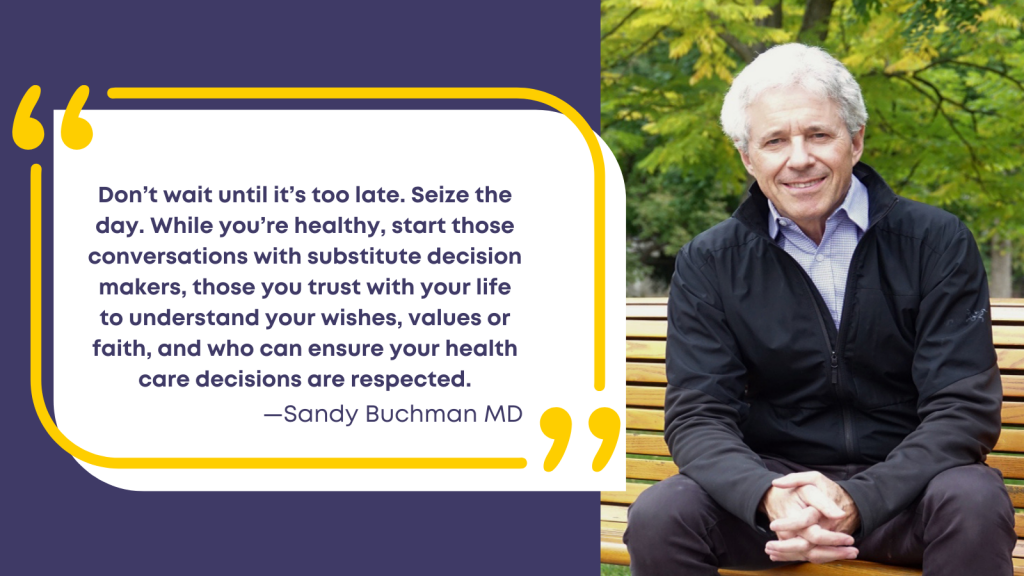The Advance Care Planning in Canada team recently sat down with Dr. Sandy Buchman, Past-President of the Canadian Medical Association and ACP champion, to discuss advance care planning and key findings from the 2021 national poll. You can follow him on Twitter @DocSandyB
Dr. Buchman was introduced to advance care planning (ACP) in the 1980s as a primary care HIV physician. Since then, he has become an avid champion of ACP and quality palliative and end-of-life care.
He knows firsthand the value of ACP conversations, both as a physician in dealing with his patients in times of crisis, and within his own family as a father to grown children and a son to ageing parents.
His advice to Canadians is simple: Don’t wait until it’s too late. Seize the day. While you’re healthy, start those conversations with substitute decision makers, those you trust with your life to understand your wishes, values or faith, and who can ensure your health care decisions are respected.
This article is the first of a multi-part part series with Dr. Buchman. In this article he discusses barriers and opportunities around advance care planning.
The 2021 national poll told us that very few Canadians (7%) were talking with their health care providers about advance care planning. Why do you think that is and what can be done?
Despite the [COVID-19] pandemic, we are still a society that denies our discussion around death and dying. We want to avoid it because it’s too painful. We’re not a culture that wants to deal with that and, hence, if we can put it off if, we do.
To be honest, I did too. But gradually I too undertook that kind of planning, even though my wife and I were in pretty good health. As our children grew we were able to handle those discussions. We undertook that process because we both knew how important it was.
People see that the process can be smooth and rewarding and meaningful, and they begin to get over that procrastination and denial. If their physician and other trusted healthcare providers introduce it in a non-judgmental way, people are willing to listen. Providers can follow up with reliable and trustworthy information and resources. ,.
People are very eager to take advance care planning and follow through but it requires the coaching and support of a trusted healthcare provider. I think they have a really important role in facilitating the process with Canadians.
In your experience what have been other barriers preventing patients from engaging in advance care planning?
I do think the lack of information from healthcare providers hasbeen a barrier. Even the lack of education and the focus on it in our training has been insufficient.
Fee schedules may not provide sufficient remuneration or periods of time to do this because it’s never been seen as critical or important, and it takes time to document these discussions.
A big problem is the lack of documentation, especially if the patient may not be able to find their plan or created one a long time ago. But what if we documented all those in the cloud and they could be accessed immediately, and downloaded in seconds?
In addition to barriers, we have opportunities. Because of the [COVID-19] pandemic, the public has become more aware of the conversations about death and dying, particularly in long-term care. They are much more aware of serious illness and the need to respect people’s wishes.
I also think people are more aware of public health, which can have an important role in promoting and educating the public about the necessity of advance care planning. Much in the way we talk about the benefits of vaccines, we could talk about the benefits of advance care planning in reducing people’s suffering.
When it comes to doing your own advance care plan, there’s no time like the present.

